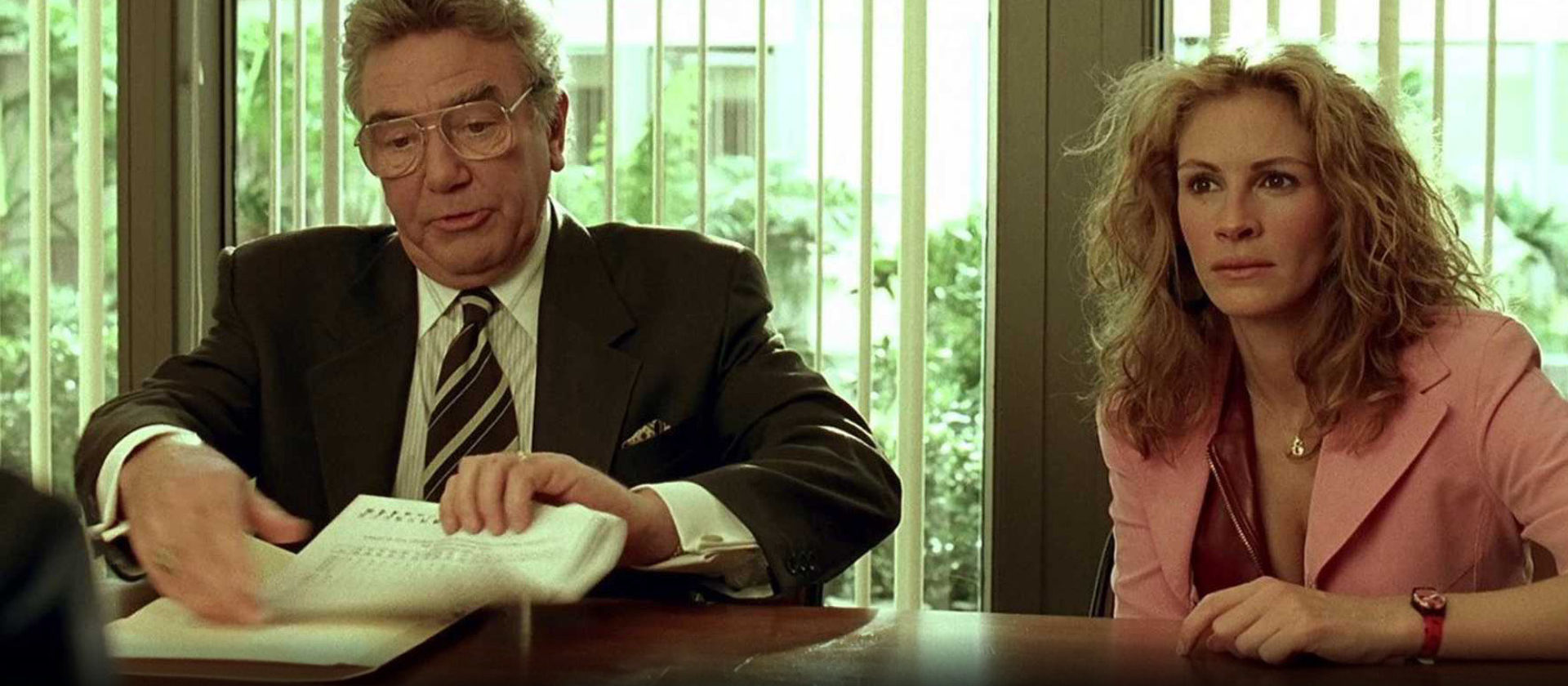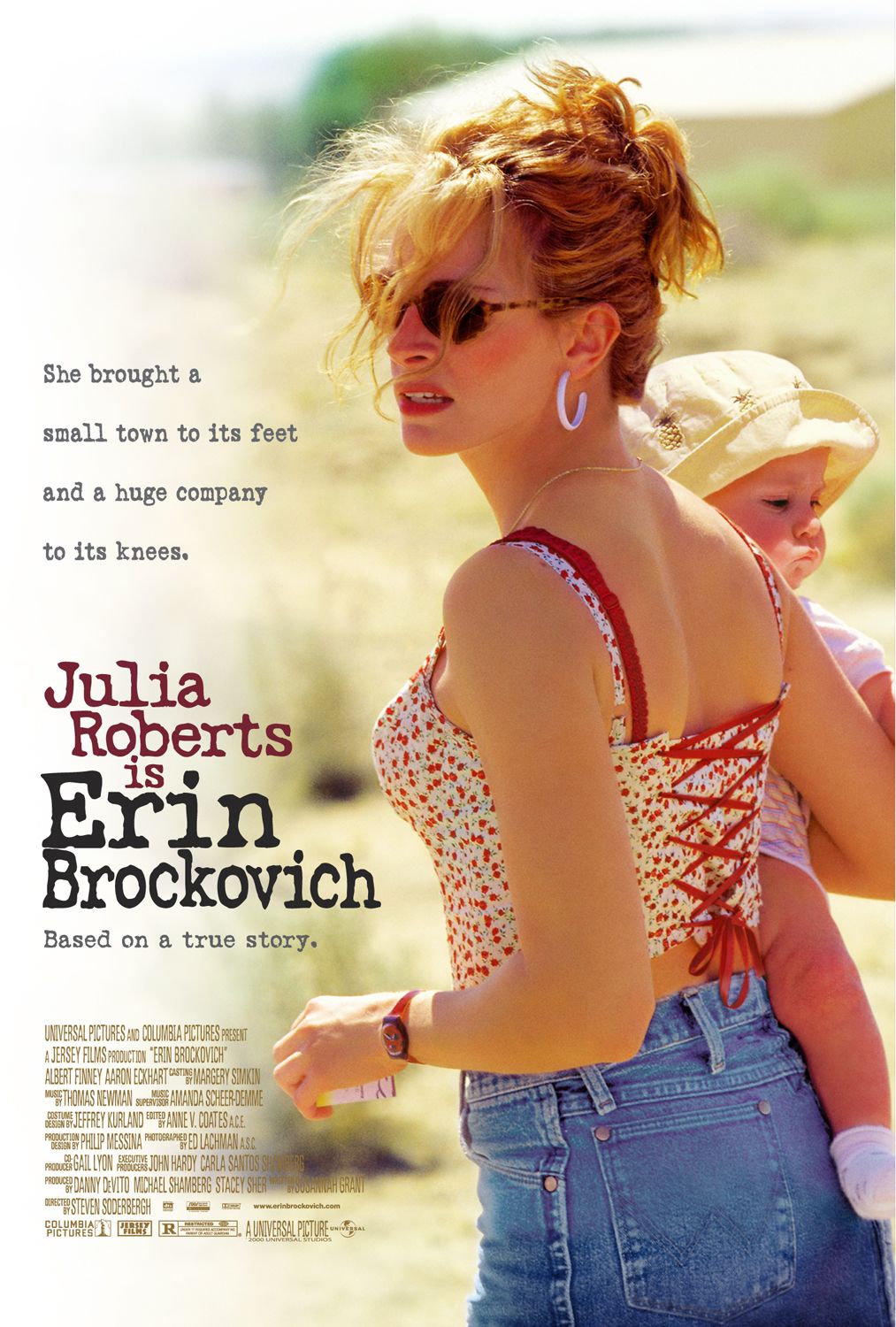

“Okay, look, I think we got off on the wrong foot here.”
“That’s all you got, lady. Two wrong feet in fucking ugly shoes.”
Erin Brockovich (Julia Roberts) is a firebrand looking for a legitimate cause. Abrasive, crude, and prone to provocative attire, she forces her way into the employ of Ed Masry (Albert Finney) after the lawyer loses her surefire court case involving a freak car accident. As a single mother without verifiable work history, her odds of landing gainful employment are slim, so she simply shows up to Masry’s small practice, starts working, and boldly demands a living wage. Masry reluctantly acquiesces but refuses to give her benefits. At least at first.
After learning the ropes for a little while, Brockovich is handling a pro bono real estate case when odd clues begin to fall into her lap. Why are there medical documents mixed into a real estate file? It turns out that Donna Jensen (Marg Helgenberger), who is contemplating selling her home to the Pacific Gas and Electric Company, simply keeps all of her PG&E correspondence in one place. The company, whose expansive factory neighbors the Jensen homestead, has been gracious enough to pay for the family’s profusion of medical treatments for tumors and Hodgkin’s lymphoma. A gesture of goodwill, perhaps? Ha! No, it’s because PG&E has been allowing a harmful chemical—hexavalent chromium—to leak into the groundwater for decades, while telling nearby residents that it was actually beneficial for their bodies! They want to simply buy out the surrounding properties and have the residents quietly move away. But Brockovich, operating on intuition alone (the film reiterates numerous times that she’s received no legal training), forsakes her children and new biker boyfriend (Aaron Eckhart) to open up a legal can of worms that eventually results in a $333M settlement for more than six hundred plaintiffs (minus Masry’s 40% cut). And forsake is the right word. Indeed, the film’s most poignant scene comes when Brockivch calls home from the road and learns that she’s missed her daughter’s first word.
Though Erin Brockovich was nominated for five Oscars (Best Picture, Director, Screenplay, Actress, and Supporting Actor), it hinges entirely on Julia Roberts’ performance, and to a lesser extent, Finney’s. As Brockovich, Roberts becomes a folk hero who can get away with cursing out her employer and talking smack to megacorp legal teams, a populist figurehead who gives a voice to the simpletons and makes us laugh with profane wisecracks, a saintly figure despite her slinky wardrobe and foul mouth. We’ve all seen legal thrillers that resemble it, but director Steven Soderbergh uses Brockovich’s unlawyerlike demeanor to remix the formula in an interesting new way. “They may not be the most sophisticated people but they do know how to divide and twenty million dollars isn’t shit when you split it between them,” she says to a PG&E lawyer. “These people don’t dream about being rich. They dream about being able to watch their kids swim in a pool without worrying that they’ll have to have a hysterectomy at the age of twenty.” Finney is a perfect complement to Roberts’ fiery performance—reluctant, cautious, diplomatic, the regular subject of Brockovich’s abuse until he turns the tables on her in a wonderful scene late in the movie.
While Soderbergh manages to make Susannah Grant’s quip-laden screenplay exciting for its duration via technique, there’s no getting around its by-the-numbers narrative (even the most prominent victims are little more than plot devices) or the fact that there’s never a solid villain standing in the hero’s way. At one point or another practically everyone in the film can be considered an obstacle—even Brockovich herself—but all it takes to overcome each momentary challenge is brash invective and cleavage. Maybe that’s how the real Erin Brockovich got things done, but it doesn’t always make for the most compelling cinema. Even so, Soderbergh adeptly disguises most of these shortcomings with a pleasant blend of anti-corporate sentiment and Grant’s crowd-pleasing witticisms.